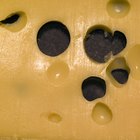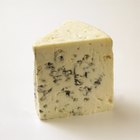vm2002/iStock/GettyImages
Depending on the brand, the date on a package of cheese can refer to the date it should be used by for best flavor or an expiration date, but should not necessarily stop you from eating the cheese. As a semi-hard to hard cheese, cheddar does have a comparatively long shelf life when stored properly and used with care. Light mold can be cut off of hard cheeses and the cheese safely eaten afterward. Freezing can extend the length of time it can be kept and used, but it will change the texture.
Cheddar Can Last
Cheddar ranges from semi-hard to hard, depending on the length of time it is aged. Traditionally made cheddar cheese hardens as it ages. Mild cheddar is typically aged for three months. Sharp cheddar, a harder cheese than the mild, usually ages about nine months before it is sold. Extra sharp cheddar is aged for at least 15 months. In general, the harder a cheese is, the longer it can be stored. Cheddar stored in the refrigerator can last one to two months past the date on the package. In the freezer, that time extends to between six and eight months.
Correct Cheddar Storage
When cheddar isn't wrapped properly, it can lose moisture, becoming too dry. If poorly wrapped, it can absorb too much moisture, leaving it vulnerable to mold. Instability in temperature allows condensation to form inside cheddar's packaging, also a mold risk. A little mold can be cut off, but if there's a lot of surface mold or the mold goes down into the cheese, it's safer to discard it. Tightly double-wrapping cheddar in plastic wrap, then putting it in a tight-sealing food storage container is the best method for refrigerating cheddar, according to Clemson University Cooperative Extension Service. To freeze it, cut it into pieces 8 ounces or smaller and wrap each one tightly with plastic wrap. Then place it in a secure, air-tight food storage bag or container.
Cleanliness Is Essential
Being scrupulously clean in the handling of cheddar can help extend its shelf life. Always wash hands freshly before touching a block or cheddar. Make sure to cut only with a clean knife on a clean surface. When skin oils and food contaminates are transferred to the surface of cheddar, deterioration and mold are likely to result. Protect cheddar from absorbing bad odors, thereby damaging its flavor, by keeping the refrigerator clean and the cheese properly stored.
Using Frozen Cheddar
Freezing cheddar, while extending its shelf life, does affect its texture, leaving it crumbly and difficult to slice. Once it has been frozen, cheddar cheese is best used in cooking, such as for cheese sauce or in omelets, or crumbled on salads or soups. Thaw it slowly in the refrigerator before using to help preserve moisture. Cheddar cheese should be used as soon as possible after it is thawed to avoid spoiling.
Related Articles

How to Freeze Cheeses

How to Store Parmigiano Reggiano

How to Defrost Frozen Mozzarella

How to Tell if Mozzarella Is Bad

Pecorino Cheese Nutrition

Does Blue Cheese Spoil?

How to Store Cheese

How to Store a Cheese Wheel With a Wax ...
How Long Can I Store Grated Pecorino ...

What Types of Cheeses Are Unpasteurized?

Do You Thaw Frozen Cheese Before ...

Does a Sliced American Cheese Product ...

Can You Melt Ricotta?

Cheeses Similar to Feta

How Can I Get Brie to the Right ...

How Can I Tell If Ricotta Cheese Has ...

The Dangers of Roquefort Cheese

What Happens to Cream Cheese if It's ...

Can I Prepare Baked Brie Ahead of Time?

The Difference Between Fresh Cheese & ...
References
Resources
Writer Bio
Sharon Secor began writing professionally in 1999, while attending Empire State University. Secor specializes primarily in personal finance and economics, and writes on a broad range of subjects. She is published in numerous online and print publications, including Freedom's Phoenix, the ObscentiyCrimes and the American Chronicle.